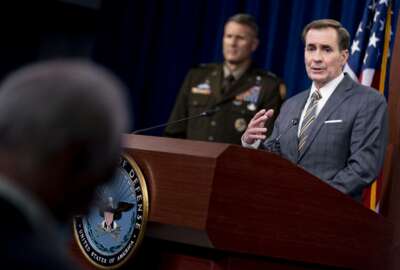What the FDA’s new vaccine approval could mean for federal employee vaccine mandates
There’s still a lot of confusion about exactly how agencies will implement President Biden’s vaccine mandate. But one thing that’s really clear is that it’s...
Best listening experience is on Chrome, Firefox or Safari. Subscribe to Federal Drive’s daily audio interviews on Apple Podcasts or PodcastOne.
There’s still a lot of confusion about exactly how agencies will implement President Biden’s mandate for all federal workers to get vaccinated or subject themselves to COVID testing. But one thing that’s really, really clear: it’s a bad idea to lie to your agency about your vaccination status. Stephanie Rapp-Tully is a federal employment attorney at partner at the law firm Tully Rinckey. She joined Federal Drive with Tom Temin to talk about the consequences of lying on those new vaccine forms, and how yesterday’s full approval of the new Pfizer vaccine changes things.
Interview transcript:
Jared Serbu: And Stephanie, I think I’d like to start with the criminalized issues here. First of all, we’ll talk in a second about the likelihood of any actual prosecutions. But what are the actual criminal statutory provisions that would be in play here? What hypothetical criminal exposure Could someone have if they lied on one of these forms,
Stephanie Rapp-Tully: No more critical exposure than a federal employee lying on any document relating to their employment. And most likely, the federal government has a tendency to put the criminal part aside and just focus on the administrative employment side issue. And they can do that giving several warnings and several declarations of prosecution. But assuming that there would be if they were to pursue some sort of criminal avenue for lying on a form relating to employment, it would, it would be a falsification of document fraudulent information, misrepresentation, something that effect and it would be relatively minor from a criminal perspective. But lying on the forum could have very serious impact for an employee’s employment because most agencies have the fence for lying on a document relating to employment as being termination. So I think employees should be more concerned about the impacts on their employment as opposed to the criminal ramifications.
Jared Serbu: I just want to stick with the criminal piece for a bit just because the administration in their communications about this has specifically called out 18 USC 1001, which I think is just kind of the catch all, don’t lie to the government statute. But my non lawyers assumption on that is that no us attorneys probably going to get very excited about bringing those cases unless there’s some kind of DOJ policy that says, “hey everybody, this is a big priority.”
Stephanie Rapp-Tully: Yeah, I would agree with that. I don’t think that this is going to be the priority in pursuing these types of claims. I think the priority is going to be employment actions, not taking criminal actions. But that’s not to say that it’s not possible. So of course, when an employee should be educated and what their total ramifications could be and criminal action is possible. I just don’t see it as being likely unless there is some policy change and they decide to pursue all.
Jared Serbu: Do agencies seem to be on pretty firm legal ground as far as setting different procedures and policies for vaccinated versus unvaccinated employees here or is some of this stuff still need to be litigated and potentially figured out in court?
Stephanie Rapp-Tully: So generally speaking, I think agencies are seem to be on on pretty solid legal ground, assuming that they take the steps that they need to take for people in protected categories. So people with religious exemptions people with medical disability exemptions, assuming that the agencies take those proper steps for those exemptions. Yes, by offering the either or on this, the agencies are on pretty good a legal foundation. There are some minor exceptions with unions needing to negotiate out a provision in the collective bargaining agreement. But overall, yes, the agencies are in pretty solid legal ground.
Jared Serbu: The piece of news around vaccines that we’ve just seen yesterday, the full authorization for the Pfizer vaccine, how if at all does this play into any of the calculus the administration’s making about how to proceed on on vaccinations, both on the civilian side and on the military side?
Stephanie Rapp-Tully: Sure. I mean, this was what the federal government I think was waiting for. There’s a precedent that if a vaccination is not FDA approved, it cannot be enforced as a requirement for particularly military. But there’s also an argument for employment, federal employment as well, now that Pfizer and FDA has now approved the Pfizer vaccination, and I believe the approval for Madonna is short coming shortly thereafter, you know, that takes that argument away. So now even more so to get Pfizer to require at least the Pfizer vaccination, that argument has been removed and it does impact the possible challenges an employee could have to being required to get the vaccination. Again, though, it’s an either/or, so if you don’t want to get the vaccination, then a federal employee can elect to do the testing requirement, the masking, social distancing, etc. – whatever the agency lays out.
Jared Serbu: Yeah, and one of the concerns that we’ve heard on testing is for whatever population of people who decline the vaccine, it could potentially be a pretty big financial burden on agencies to do that volume of testing. So I wonder, does full approval, make it more likely that an agency or the entire administration would eliminate that option completely and just say, “hey everybody, we’re getting vaccinated?”
Stephanie Rapp-Tully: I think, at least at the start of this, the agencies and the federal government are very smart to offer that either/or, because again it takes away possible legal challenges to this by offering an alternative. I don’t think that that will change. I think that providing an either/or is necessary to full implementation of this program. It will, though, be a lot of administrative work because of the amount of time that will be allowed to have by employees, payment for that time, etc. The in facility testing areas, setting those up, recording those testings, all of that implementation is going to be – well, I don’t envy the people who are in charge of that. Because it’s a lot depending on how many people say I’m not going to attest to being vaccinated or not vaccinated.
Jared Serbu: Last thing I wanted to ask you about Stephanie, as you already mentioned earlier in the conversation that lying on this form, a likely consequence would be termination. What about implications for things like security clearances or any other thing that would require a person to be in a position of special trust?
Stephanie Rapp-Tully: Oh, definitely. If you lie on the form and you have a security clearance, I would expect a serious problem with that security clearance. That’s true, lying on anything with regards to a security clearance, it can impact your status. So if an employee has a security clearance, that is definitely something to take into consideration, because it will, I’m not gonna say will likely, it will have ramifications for clearance.
Jared Serbu: If the clearance adjudicator finds out I mean, are people I don’t want to say is it wise? Is it? Is it something that somebody could potentially get away with? How easy is something like this to discover if you’re a supervisor or if you’re a clearance, adjudicator?
Stephanie Rapp-Tully: It depends. I mean, with security clearances, investigators have a wide purview of what they can investigate, right. And so any posting on social media, any email, any correspondence with a friend, any interviews with neighbors, that’s all within the purview of a security clearance investigation. If you tell your neighbor, “oh I’m not really vaccinated, but I’m gonna tell my supervisor,” and then that neighbor is interviewed, boom. I mean, it’s just not smart to do lying on the that form is not an intelligent move, particularly if you have a security clearance.
Copyright © 2024 Federal News Network. All rights reserved. This website is not intended for users located within the European Economic Area.
Tom Temin is host of the Federal Drive and has been providing insight on federal technology and management issues for more than 30 years.
Follow @tteminWFED






